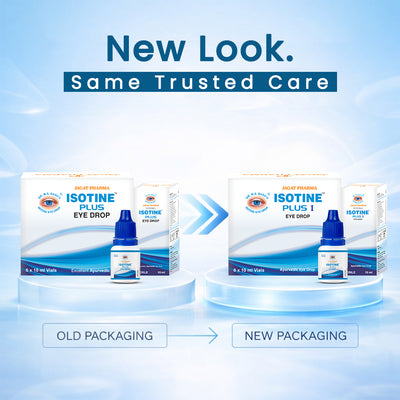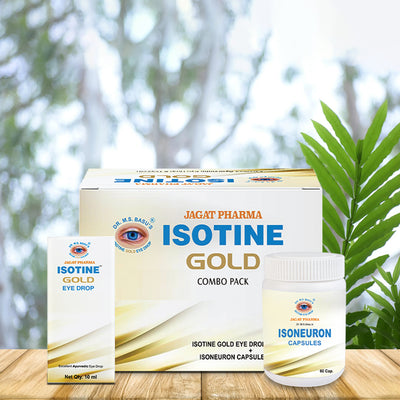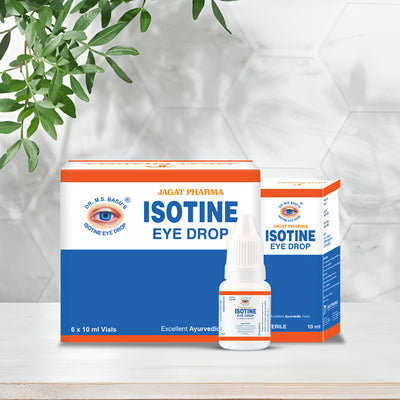
10 Essential Nutrients That Improve Eyesight
Good eyesight is crucial for our daily functioning and overall well-being. Proper eye nutrition, including foods high in antioxidants like vitamin C and beta-carotene, is essential for maintaining clear vision and preventing age-related eye diseases.
While genetics plays an essential role in determining our eye health, incorporating certain nutrients into our diet can also enhance and maintain our vision. Let's explore the top nutrients for eye health that improve eyesight and maintain optimal vision.
Best Nutrients for Eye Health
Vitamin A:
Vitamin A is essential to maintain good vision, particularly in low-light conditions. It helps form rhodopsin, a pigment found in the retina that aids in night vision. Sources of vitamin A include carrots, sweet potatoes, spinach, kale, and liver.
Vitamin C:
Vitamin C, an antioxidant, helps protect the eyes from oxidative stress and the harm produced by free radicals. It also helps support the health of blood vessels in the eyes, reducing the risk of conditions like cataracts and macular degeneration. Citrus fruits, bell peppers, strawberries, and broccoli are excellent sources of vitamin C.
Vitamin E:
Vitamin E acts as an antioxidant, shielding the eyes from oxidative harm while bolstering the health of eye cell membranes, thus fostering optimal vision. Foods like nuts, seeds, vegetable oils, and leafy greens are abundant sources of this essential nutrient.
Zinc:
Zinc's pivotal function lies in ferrying vitamin A from the liver to the retina, facilitating the production of melanin, a vital protective pigment crucial for maintaining eye health. It also helps maintain the structure of eye tissues and supports the functioning of enzymes involved in visual signalling. Oysters, beef, poultry, beans, and nuts are excellent sources of zinc.
Omega-3 Fatty Acids:
Omega-3 fatty acids, particularly DHA (docosahexaenoic acid), are essential for developing and maintaining retinal health. They help prevent dry eyes, reduce the risk of macular degeneration, and support overall eye function. Fatty fish like salmon, mackerel, sardines, and flaxseeds & walnuts are rich in omega-3 fatty acids.
Lutein and Zeaxanthin:
Lutein and zeaxanthin are carotenoids and act as antioxidants in the eyes, protecting them from harmful blue light and oxidative damage. They also help maintain the density of macular pigment, which is crucial for central vision and reducing the risk of age-related macular degeneration. Leafy greens, egg yolks, corn, and peppers are excellent sources of lutein and zeaxanthin.
Beta-Carotene:
Beta-carotene acts as a precursor for the production of vitamin A and is a powerful antioxidant, crucial for sustaining optimal vision. It shields the eyes from harm induced by UV radiation and oxidative stress, thereby diminishing the likelihood of cataracts and macular degeneration. Carrots, sweet potatoes, pumpkin, and spinach are rich sources of beta-carotene.
Riboflavin (Vitamin B2):
Riboflavin is vital for sustaining corneal health and averting conditions such as cataracts and keratoconus. Additionally, it aids in the absorption of other essential nutrients crucial for eye well-being, including vitamins A and C. Rich dietary sources of riboflavin include milk, eggs, lean meats, and green leafy vegetables.
Copper:
Copper, a trace mineral, holds significant importance in the synthesis of melanin, a protective pigment shielding the eyes against UV damage and oxidative stress. Moreover, it fosters the well-being of blood vessels within the eyes and aids in preserving the structural integrity of eye tissues. Abundant sources of copper include shellfish, nuts, seeds, and whole grains.
Selenium:
Selenium, a crucial mineral, collaborates with antioxidants such as vitamin E to safeguard the eyes against oxidative harm. Additionally, it aids in the activity of enzymes engaged in thyroid hormone metabolism, thus indirectly influencing eye health. Excellent dietary sources of selenium encompass Brazil nuts, seafood, whole grains, and eggs.
Incorporating different nutrient-rich foods into your diet is essential for maintaining good eyesight and preventing eye-related problems. By ensuring adequate intake of vitamins A, C, and E, zinc, omega-3 fatty acids, lutein, zeaxanthin, beta-carotene, riboflavin, copper, and selenium, you can support your eye health and enjoy clear vision for years to come.
Best Foods to Improve Eyesight
Leafy greens such as spinach contain lutein and zeaxanthin, antioxidants that decrease the risk of developing eye conditions like macular degeneration and cataracts.
Carrots contain beta-carotene, a precursor to vitamin A, essential for maintaining optimal vision, particularly in low-light conditions.
Sweet potatoes, akin to carrots, are rich in beta-carotene and also offer a generous supply of vitamin E, aiding in the prevention of age-related macular degeneration.
Citrus fruits like oranges, grapefruits, and lemons are abundant in vitamin C, an antioxidant that may diminish the risk of cataracts and macular degeneration.
Berries, such as strawberries and blueberries, are abundant in antioxidants like vitamin C, potentially safeguarding the eyes against harm caused by free radicals.
Rich in omega-3 fatty acids, essential for eye health, fatty fish like salmon and mackerel may provide protection against dry eyes, macular degeneration, and glaucoma.
Nuts like almonds, walnuts, flaxseeds, and chia seeds are loaded with vitamin E & omega-3 fatty acids, potentially helping to prevent age-related eye conditions.
Eggs are a notable source of lutein, zeaxanthin, and zinc, all vital for maintaining overall eye health.
Bell peppers, known for their vibrant colors, are rich in both vitamin C and beta-carotene, contributing to optimal eye health.
Whole grains like quinoa, whole wheat bread, and brown rice are abundant sources of vitamin E, zinc, and niacin, potentially lowering the risk of developing cataracts and macular degeneration.
Incorporating these foods into your diet and a balanced and healthy lifestyle can help support and improve your eye health over time.
Isotine Plus Eye Drops for Eye Health
Isotine Plus Eye Drop is an Ayurvedic proprietary remedy purported to aid various eye conditions, including diabetic retinopathy. However, it's crucial to acknowledge that while some individuals may find relief with alternative treatments like Isotine Plus, scientific evidence specifically for diabetic retinopathy is limited. Diabetic retinopathy necessitates careful management and treatment under qualified medical supervision. Concurrently, Isotine Plus Eye Drop's Ayurvedic formulations may provide symptomatic relief or support overall eye health. Treatment for diabetic retinopathy typically involves controlling high blood sugar, pressure, and lipid levels to halt further retinal vessel damage, with medical interventions such as laser therapy, injections, or surgery as considerations. Isotine Plus Eye Drop's affordability enhances accessibility for those seeking potential relief for various eye conditions.
Conclusion
In summary, prioritizing eye health is vital for overall wellness, and a balanced diet rich in essential nutrients is key to supporting clear vision. Including nutrient-dense foods such as leafy greens, fatty fish, nuts, and citrus fruits can aid in preventing age-related eye issues and maintaining optimal visual health. Nonetheless, for conditions like diabetic retinopathy, seeking advice from qualified medical experts remains imperative.


